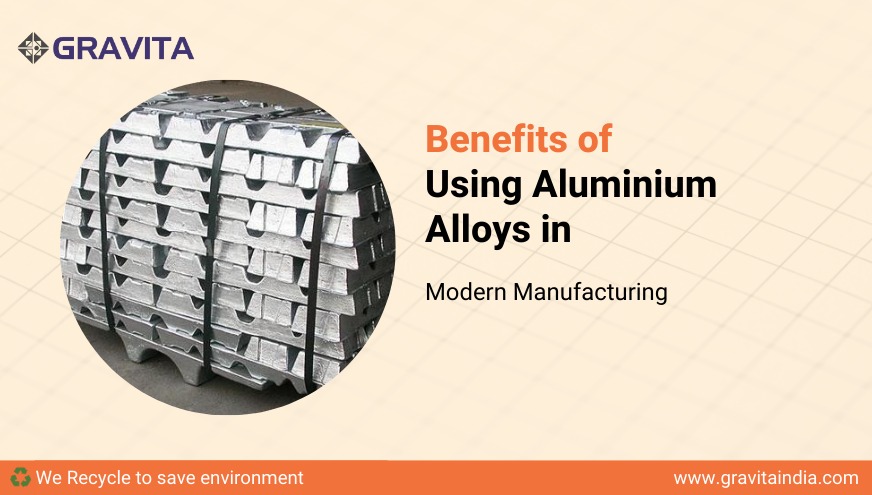The benefits of using aluminium alloys in modern manufacturing, include lightweight strength, corrosion resistance, versatility, and improved efficiency in various applications

Aluminium alloys have become a cornerstone of modern manufacturing due to their exceptional properties and versatility. From the automotive industry to aerospace, construction, and consumer electronics, aluminium alloys are integral to numerous applications. Their unique combination of lightweight, strength, and resistance to corrosion makes them ideal for a wide range of manufacturing needs. This blog explores the numerous benefits of using aluminium alloys in modern manufacturing.
Lightweight and High Strength
One of the most significant advantages of aluminium alloys is their lightweight nature combined with high strength. Aluminium alloys can achieve the same strength as steel but at a fraction of the weight. This characteristic is particularly crucial in industries such as automotive and aerospace, where reducing weight is directly related to improving fuel efficiency and performance. For example, in the automotive industry, the use of aluminium alloys helps in manufacturing lighter vehicles, leading to better fuel economy and reduced greenhouse gas emissions.
Corrosion Resistance
Aluminium alloys are renowned for their excellent resistance to corrosion. This property is due to the formation of a thin oxide layer on the surface of aluminium, which protects it from further oxidation. This makes aluminium alloys ideal for applications exposed to harsh environmental conditions, such as marine environments, outdoor structures, and chemical industries. The long-lasting nature of aluminium alloys reduces the need for frequent replacements, leading to cost savings and enhanced durability.
Versatility and Formability
Aluminium alloys offer remarkable versatility in terms of formability and machinability. They can be easily cast, extruded, rolled, and forged into a wide variety of shapes and sizes. This flexibility allows manufacturers to create complex and intricate components tailored to specific applications. In the electronics industry, for instance, aluminium alloys are used to produce lightweight and heat-conductive casings for smartphones, laptops, and other devices.
Thermal and Electrical Conductivity
Another significant benefit of aluminium alloys is their excellent thermal and electrical conductivity. Aluminium is an efficient conductor of heat and electricity, making it an ideal material for applications requiring efficient heat dissipation and electrical transmission. In the electronics and electrical industries, aluminium alloys are commonly used in heat sinks, conductors, and wiring systems. Their ability to dissipate heat effectively ensures the longevity and performance of electronic devices and components.
Recyclability and Sustainability
Aluminium alloys are highly recyclable, making them an environmentally friendly choice for modern manufacturing. Recycling aluminium requires only a fraction of the energy needed to produce primary aluminium from raw materials, resulting in significant energy savings and reduced carbon emissions. The recyclability of aluminium alloys aligns with the principles of the circular economy, promoting sustainable manufacturing practices. Companies across various industries are increasingly prioritizing the use of recycled aluminium to minimize their environmental footprint.
Cost-Effectiveness
The cost-effectiveness of aluminium alloys is another reason for their widespread use in manufacturing. While the initial cost of aluminium may be higher than some other materials, its long-term benefits, such as durability, low maintenance, and recyclability, contribute to overall cost savings. Additionally, the reduced weight of aluminium components can lead to lower transportation costs and improved fuel efficiency in automotive and aerospace applications.
Applications Across Industries
The applications of aluminium alloys are diverse and span across multiple industries:
1. Automotive Industry:
○ Aluminium alloys are used in the manufacturing of engine components, body panels, wheels, and frames. Their lightweight nature contributes to improved fuel efficiency and reduced emissions.
2. Aerospace Industry:
○ The aerospace sector relies on aluminium alloys for constructing aircraft frames, wings, and engine components. The high strength-to-weight ratio of aluminium alloys enhances the performance and fuel efficiency of aircraft.
3. Construction Industry:
○ Aluminium alloys are widely used in the construction of buildings, bridges, and infrastructure projects. Their corrosion resistance and formability make them ideal for architectural applications.
4. Electronics Industry:
○ In the electronics sector, aluminium alloys are used in heat sinks, casings, and conductive components. Their thermal conductivity ensures efficient heat dissipation in electronic devices.
5. Marine Industry:
○ Aluminium alloys are used in the construction of ships, boats, and offshore structures due to their resistance to corrosion and lightweight properties.
The benefits of using aluminium alloys in modern manufacturing are numerous and impactful. Their lightweight nature, high strength, corrosion resistance, versatility, and recyclability make them indispensable in various industries. Manufacturers, including the "Manufacturer of Aluminium Alloys In India," are pivotal in supplying high-quality alloys that meet the evolving needs of the market. As industries continue to prioritize sustainability and efficiency, the role of aluminium alloys in modern manufacturing will only grow, driving innovation and progress across the globe.



